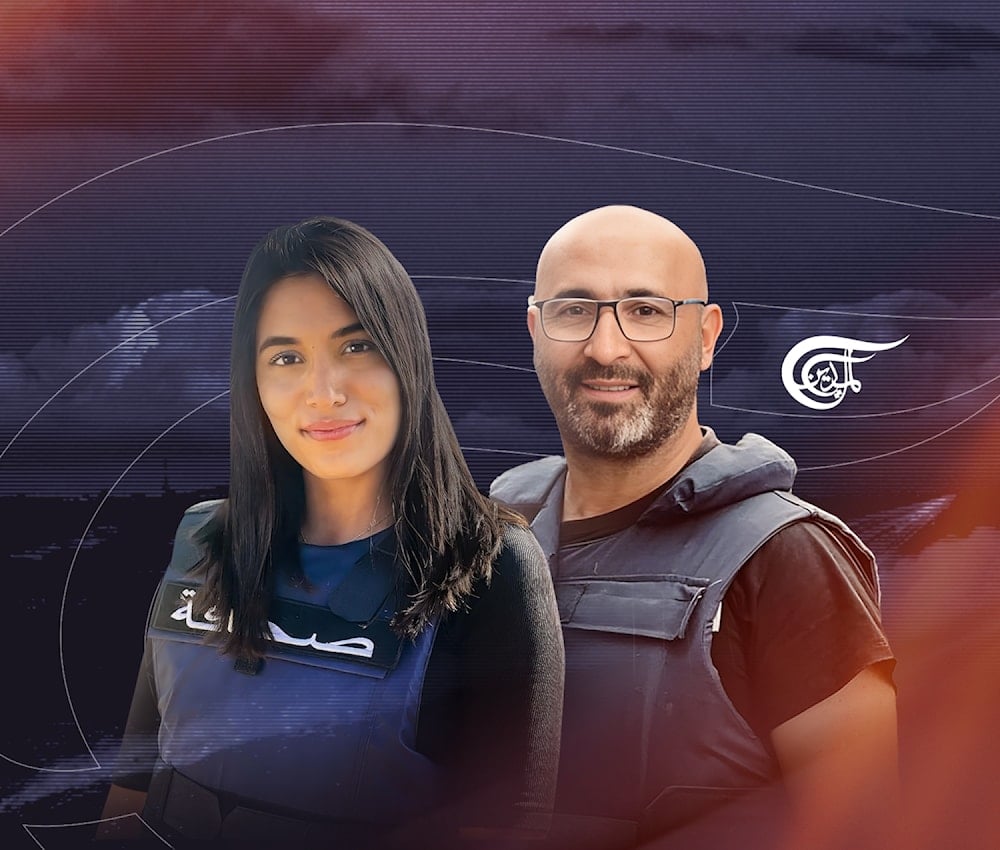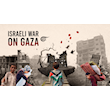Martyrs and press freedoms
The Israeli Occupation attempts to shut down Al Mayadeen Network in occupied territories have already failed. If anything, these acts have strengthened journalistic resolve to expose the world’s most brutal military occupation.
-

Without question, Farah and Rabih’s sacrifices are here to stay (Illustrated by Mahdi Rteil to Al Mayadeen English)
The Israeli occupation’s assault on press freedoms continues to reach unprecedented extremes. Nowhere is this more visible than in the occupation airstrike that murdered Al Mayadeen correspondent Farah Omar and cameraman Rabih Me'mari in South Lebanon. The blatant massacre is a telling reminder that "Israel" is overwhelmingly unsettled by heroic and principled brands of journalism that never bought falsehoods on Gaza. Al Mayadeen and its targeted personnel refused to waver in their support for the Palestinian resistance. That is precisely what undoes the Israeli war machine from within, and prompts it to target voices critical of genocide.
Without question, Farah and Rabih’s sacrifices are here to stay. They shine to the benefit of a defiant, besieged and gifted Palestinian resistance. As such, no amount of murderous occupation assaults on Al Mayadeen will ever hamper press commitments to delivering the truth or reporting facts amid brutal bombings and occupation bloodshed. "Israel" conducted its killings of Al Mayadeen journalists precisely because their coverage of Israeli genocide remains a principal threat to fake counternarratives and occupation bluster. For instance, the network has made an example out of its swift documentation of occupation war crimes. Brave live broadcasts add to that resilience, cutting through hollow occupation threats of a total shutdown. Therefore, refusal to change course is bound to expose the occupation’s denialist narrative on the regional and international stage.
Latest signs include the Lebanese foreign ministry’s complaint to the United Nations Security Council (UNSC) over the Israeli massacre of journalists Farah, Rabih and freelancer Hussein Akil. “The martyrdom of dozens of journalists and cameramen in Gaza and South Lebanon in the brutal attacks of the fake Israeli regime, including the martyrdom of two hard-working Al Mayadeen journalists, shows the influence and special role of journalists in portraying the genocide and war crimes of the Israeli regime and awakening the public opinion of the world,” wrote Iranian Foreign Minister Hossein Amir-Abdollahian in a separate post this week.
Farah and Rabih’s martyrdom makes it abundantly clear to "Israel" that it cannot change facts written in blood – be it the 14,500 Palestinians murdered in Gaza or the journalists who lived their last for this network. The Israeli Occupation attempts to shut down Al Mayadeen Network in occupied territories have already failed. If anything, these acts have strengthened journalistic resolve to expose the world’s most brutal military occupation, dialing up the need for all-important scrutiny and media accountability. In fact, the more that the Israeli occupation proceeds with this onslaught against journalists, the more retaliation it will invite to its peril.
Consider the fact that Lebanese resistance fighters carried out distinct retaliatory attacks against Israeli military targets in the very aftermath of Farah and her colleagues’ assassination. It was the direct consequence of unrelenting Israeli atrocities that the occupation assumes as its own prerogative. "Israel" was warned well in advance that it must avoid these excesses or face consequences. Movement towards the latter will contribute to the occupation’s own undoing.
The direct aftermath of the massacres has an important message: The disintegration of the Israeli disinformation machinery. Consider the fact that indiscriminate attacks on journalistic lives and liberties are creating an untenable storm for the occupation. The myth of so-called “accidental” strikes against journalists is being exposed for its zero credibility as well. Now press appeals, activism and calls for accountability appear to transcend beyond borders, putting "Israel"’s compliant press machinery and their propaganda campaigning in the dark.
See it for yourself: the Committee to Protect Journalists is the latest to underscore the gravity of Farah and Rabih’s murders. The Committee added to a growing climate of scrutiny against "Israel"’s illegal occupation, responsible for lifting the death toll to over 50 for journalists covering the October 7 war and genocide. Even a highly selective Western media is forced to entertain bolder headlines that demonstrate the extent of "Israel"’s genocide spillover in to other regions, principally Lebanon. The resistance has been clear in its resolve to keep the Palestinian cause and Lebanese sovereignty out of bounds for brutal occupation excesses. Farah and Rabih’s killing makes it clear that the need for brave, consistent and genuine journalism is more evident than ever.
Public support is central to the credibility and trust of any committed media apparatus. The coming together of hundreds of mourners in Beirut this week for Farah and Rabih is a telling reminder that their journalism and legacy strike a chord with consumers of truth. They were part of a network that prides itself on the “right of people to resist occupation, specifically the “Israeli” occupation of Palestine and the Arab lands.” Now as that same occupation attempts to target Al-Mayadeen journalists for that very same commitment, the platform’s heroes have a message to share: that Israeli belligerence is the single biggest threat to press freedoms and journalistic liberties.
This is a time for press champions to wake up and cover the Gaza genocide in granular detail. Bowing down isn’t an option.

 Hannan Hussain
Hannan Hussain
 5 Min Read
5 Min Read












